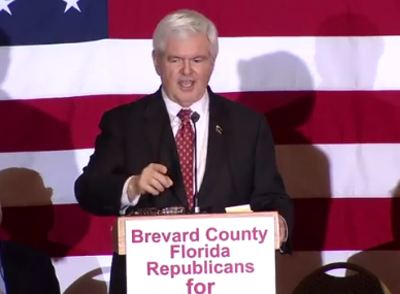Following Newt to the Moonby Joseph Mascaro
|
| Trying to invoke JFK, Gingrich fell flat. |
That’s why I was heartened last month when Newt Gingrich announced he was going to give a major address on Florida’s Space Coast. The announcement might have looked like a pander to Florida primary voters disillusioned by President Obama’s tepid vision for space exploration, but, in fact, Gingrich has expressed a sustained interest in human spaceflight throughout his career. He has schemed over dinner with rocket man and spaceflight promoter Robert Zubrin (author of The Case for Mars), and co-authored an op-ed two years ago praising the President for increasing funding for commercial spaceflight.
So, I checked my Democratic Party registration at the door and tuned in.
But my hopes came, well, crashing back to Earth. Trying to invoke JFK, Gingrich fell flat. His proposed lunar colony borrowed 1960s lingo, but failed to convey the thirst or collective determination that permeated 1960s American families. As with President George W. Bush’s Constellation program, the goal of a lunar settlement seemed like a re-hash of our past exploits. Worse still, his promise of establishing the colony by the end of his “second term” and his suggestion that it would be the 51st state buried the substance of what he said under reels of late-night comedy.
At a debate the next night, his opponents pounced, dismantling the idea of increasing spending on human spaceflight in a country drowning in debt. Santorum said the Moon can wait. Romney said he would fire anyone who proposed such an idea, and this time Romney’s tone-deaf obsession with canning people seemed to land cleanly, because the audience agreed.
Like climate change deniers’ notion that the Earth is too big to possibly be altered by humans, human spaceflight suffers from a common but misguided gut reaction, which goes something like this: “We have plenty of problems right here on Earth.”
| Our guts tell us that human spaceflight will distract us from tackling debt or battling terrorism, but this is all wrong. |
This is a false premise. Exploration and discovery are not luxuries that we can do once we have fixed the rest of our problems. They are simply part of our humanity. In national discourse we rightly focus on existential threats —Iran, debt, climate change—but to thrive, we must also consider existential opportunities. The opportunity for exploration is real. Private companies like SpaceX are bringing rocket costs down, hints of water on the surface of Mars are captivating scientists, and China’s aggressive human spaceflight planning is stirring congressional inquiry.
Our guts tell us that human spaceflight will distract us from tackling debt or battling terrorism, but this is all wrong. Real missions with real people, strapped in tuna cans for six months and sending tweets from the Martian surface, will not distract us from anything. It will awaken the sleepwalking students in our broken education system. It will steer our talents where we need them most: engineering, energy, and manufacturing. This is the right time to have a sustained national discussion, and Gingrich should be applauded for trying to start one, likely knowing his opponents would roll their eyes.
Gingrich was a child of Apollo, and so was Christa McAuliffe—the teacher that perished aboard Challenger 26 years ago this January. Critics often charge that Apollo was all about geopolitics and not about science. This is true on the merits, but it is also irrelevant. The inspiration summoned by Apollo was real, and the benefits to science and engineering are well documented in huge increases in graduate degrees and science careers. Still greater was the benefit to our common purpose.
Christa McAuliffe became a mother and a schoolteacher, and eventually an explorer and an inspiration to millions of children. I was one of them. Now I am part of a research team trying to slow climate change and deforestation, and my mom is still teaching.
Our hearts are in the stars.
